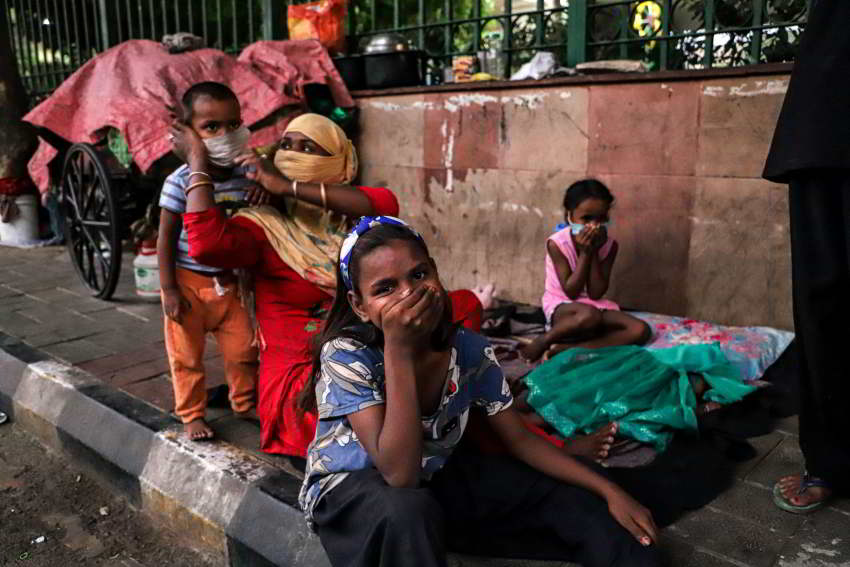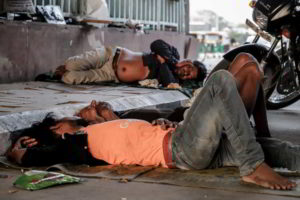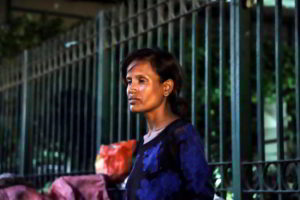India’s 2 million homeless: Unseen victims of Covid-19

Jashoda and Tilak migrated to Delhi from their native village in Rajasthan just before the nationwide lockdown was imposed in March (MIG Photos/ Aman Kanojiya)
According to the Housing and Land Rights Network of India, an NGO that fights for the right to housing among others, the number of homeless people in India is much more than the official estimates of 1 million. It says that about one percent of residents of all Indian cities are homeless. India also has the highest number of children on the streets in the world. Besides outside bus terminals and railway stations, the space under the numerous flyovers in the country’s urban areas are the favourite places for the homeless to find shelter.
In the absence of any data on their actual numbers, age, gender or any other socio-economic parameters, it is nearly impossible to gauge the impact of the Covid-19 pandemic on the homeless. But it would be safe to say that most of them have only seen their livelihood deteriorate since the onset of the Covid-19 pandemic.
“My husband and I pick recyclable glass and plastic bottles from the garbage. We earn INR 40 everyday. My children beg on the traffic signal. They also make the same amount of money. With our earnings, we can only afford to buy some food, but even that is insufficient for a single meal for my family of four everyday,” says Jashoda, a migrant from Madhopur, Rajasthan.

The area under Moolchand flyover in South Delhi is a shelter for more than 30 homeless people (MIG Photos/ Aman Kanojiya)
Jashoda lives under the Moolchand flyover in south Delhi. It is also a shelter for 30 other homeless people in the national capital. Jashoda has a family of five including her husband and three children. She migrated from her native village in Rajasthan to Delhi just before the nationwide lockdown was imposed in March. Contrary to her expectation of a better livelihood in Delhi, her family is forced to beg for a few coins and some food everyday.
In March, while they were still in Rajasthan, Jashoda, her husband and their three children had no means to get any authentic information about the Covid19 pandemic and probability of a lockdown. It was only after they reached Delhi, they realised that they had made a serious mistake.
“We could not find any jobs in our native village and had to beg for survival. Some villagers told us that migrating to a metro city would increase our chances of finding a job. So, we came to Delhi. But just after two days of our arrival, our world turned upside down. A contractor had promised to employ us but then he backed out and asked us to stay away as we had travelled on a train. We came to know about the pandemic only after a policeman asked us not to sleep under this flyover, citing the risk of infections,” she adds.
Jashoda’s husband, Tilak says that they sleep on an empty stomach on most nights as people fear coming in contact with them and have also stopped giving money or food. They have received no help from the government whatsoever and police often threaten them about sleeping under the flyover. “We have received absolutely no help from the government. Local police often chases us and threatens to arrest us while we sleep on pavements and under this flyover,” says Tilak.
“We thought of spending the night in night shelters but it is filled with people doing drugs, abusing and fighting. I can’t take my family there,” Tilak adds.
Only about 8 km from Moolchand, is Nizamuddin flyover in Sarai Kale Khan, also in the southern part of Delhi. The Nizamuddin flyover was a major site of protest during the anti CAA protest in the New Delhi, from December last year to February this year.
With protest slogans and graffiti, faded but still visible on its walls, Nizamuddin flyover provides shelter to about 50 homeless people. One can easily spot a few people sleeping under the flyover even at day time. A few tattered mattresses, few utensils and some food is kept on the pavements and hung on the fence.

Mehrunisa, a mother of four, has been begging to feed her family for past six months (MIG Photos/Aman Kanojiya)
It is not just the pandemic or even hunger that the people living on the streets face, they also face a risk from vehicular traffic. There have been frequent reports of accidents where vehicles crush people sleeping on pavements in various cities. “We have been living here for a long time. My husband passed away just before the lockdown was imposed. He was hit by a car. Though we rushed him to a nearby government hospital, he couldn’t be saved. An advocate told me to ask for compensation by filing a case but the sudden lockdown has hampered the legal proceedings,” says 26-year-old Mehrunisa, a mother of four.
“We are always scared for the safety of our family members, especially children as they play on the road, begging on traffic signals and sleep on the roadside. Thefts and accidents have been a part of our lives for as long as I can remember. My husband was the sole earning member in our family of six. He sold toys in the market. Since his demise, we have been forced to beg in order to feed ourselves. I am still waiting to get some amount of compensation for my husband’s demise as my children to remain hungry throughout the day. Of course, the lockdown has only forced us in a worse situation,” explains Mehrunisa.
With no money and documents to help them access relief measures in terms of food, health, water, shelter, sanitation and medical emergencies, the homeless are amongst the most vulnerable to immediate impact and aftermath of the Covid-19 health and economic crisis.
“I will get some paperwork done to ensure that my children are accepted in government schools. I really wish to educate my children and make sure that they don’t live a life begging, doing drugs and involved in crimes. Once I get my compensation, I’ll send them to a government school and make sure they grow up to lead a better life than me,” Mehrunisa sums up.
While the rest of the country is trying to return to normal life, millions like Jashoda, Tilak and Mehrunisa, across the country, struggle for a roof and a single meal everyday. In absence of any government help and with constant threats from the local police, they cling on to their lives on the margins, ignored and unheard by the society at large.









